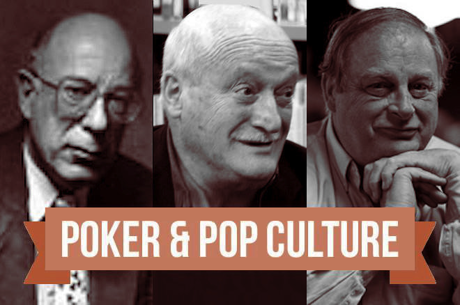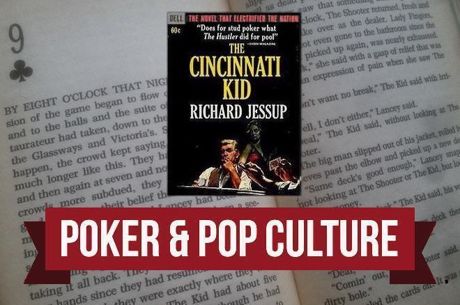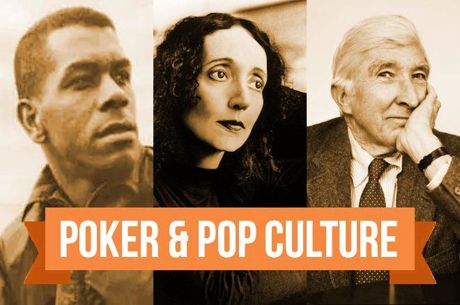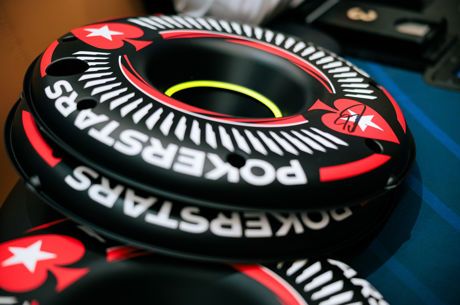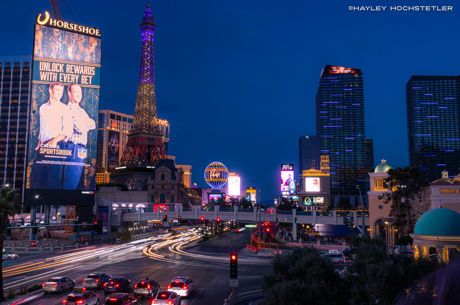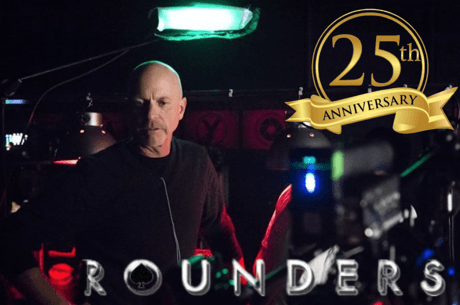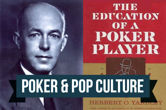Poker & Pop Culture: 'King of a Small World' and 'Shut Up and Deal'
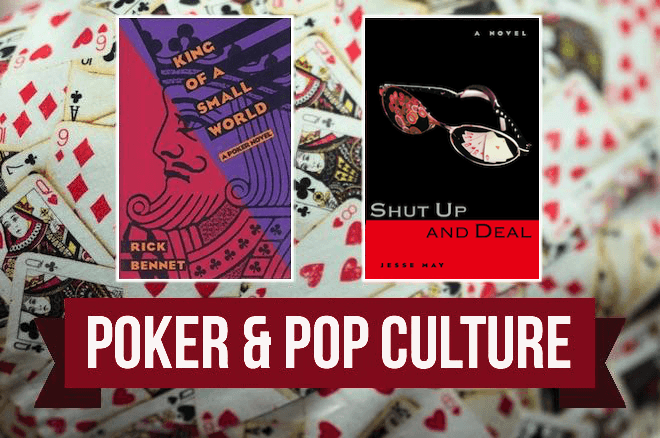
While Las Vegas and California have long been primary poker hubs in the United States, it wasn't until the 1990s that legal, regulated poker gained a foothold in the northeast.
It was in late June 1993 that legal poker finally began to be dealt in Atlantic City. New Jersey's Casino Control Act of 1977 had sanctioned other gambling games, including baccarat, blackjack, craps, slots, roulette, and big six wheel, though not poker. But by the early 1990s lawmakers had begun seriously considering removing the prohibition, and eventually legislation was passed to include poker among the permitted games.
Meanwhile not far away in Maryland there existed a thriving poker scene fueled by the popular, nightly games spread in many "charity" casinos throughout Prince George's County. Such games raised money for various community organizations such as the Boys' and Girls' Clubs and Jaycees, as well as for volunteer fire departments (that also often also hosted games), thereby providing legal cover to operate.
Those curious to learn more about how poker was played in the 1990s and about these two historically important poker subcultures are in luck thanks to a couple of excellent novels written by poker-playing writers well familiar with each �� King of a Small World by Rick Bennet and Shut Up and Deal by Jesse May.
Rick Bennet, King of a Small World (1995)
Bennet's first novel King of a Small World is subtitled "A Poker Novel," signaling right away a target audience of card players and those with an interest in the game. That said, there's plenty enough plot and character to engage even those without a special interest in poker.
King of a Small World presents a smart, gritty, coming-of-age story that centers on a wiser-than-his-years young gun named Joey "Pinocchio" Moore, a successful player in his mid-20s. Joey mostly sticks to underground games and to the ones in those aforementioned charity casinos in his native Maryland. It's a "small world" where he does, at times, perhaps reign as a kind of "king," although he will additionally take his game to Atlantic City, Las Vegas, and elsewhere in search of further challenges.
Poker fuels both the plot of the book and contributes heavily to its various themes, with Bennet drawing connections between the game and Joey's complicated life full of conflicts and relationships.
We quickly discover how poker has put Joey in touch with a wide assortment of friends, foes, and few who could go either way. We also eventually learn how poker and gambling have aggressively shaped the value systems of both Joey and others, as demonstrated in their interactions �� sometimes cautious, other times dangerously reckless.
Early on Joey is offered a chance to be the poker boss at a newly-opening charity casino. Joey hesitates at first. After all, as someone making his living playing cards, he's already "free and happy" operating outside the mostly grim, work-a-day world populated by "normal people."
"What a bunch of losers people are," he says at one point. "Working like dogs so they can have things."
But finally "the prospect of a great-paying, easy-as-can-be, two-day-a-week job" becomes a kind of "freeroll" in his mind, and he accepts the position. Bennet does well filling out details of the technically legal but still sketchy world of the charity casino, where the rapid influx of money soon engenders a number of conflicts among those running the show.
Additional complications in Joey's world include the pregnancy of an ex-girlfriend, plus relationships with a couple of other women. The plot is a more than a little twisty, additionally involving a missing father who abandoned Joey as a child, an ex-con living with his mother, and other (possibly nefarious) connections involving the casino owners.
As noted there are a number of instances in which Joey draws comparisons between poker and the many other "games" people play away from the tables. Along the way Joey will sometimes offer poker-themed commentaries about human behavior and the always-shifting meaning of our existence.
To share an example, at one point Joey makes a trip to Vegas (at WSOP time) and shares his impression of the urgent and unceasing human drama he sees being played out around him in the casinos.
"This is how gambling works �� it fills the senses," Joey explains. "Close your eyes and listen. In a casino, you'll hear the sounds of jingling, clinking, clanging, clicking. Open your eyes and you'll see the myriad colors of lighting and carpeting and walls and uniforms, shining and bright. Taste? Free drinks and meals to any decent-sized bettor. Free drinks and cheap meals to everyone. Touch, too, is thought of. Plush carpeting, brass rails, leather chairs, polished wood. And maybe in the air, with the smoke, is sweat."
Such detail brings an immediacy to the scene, especially for readers who've been inside such places. Joey has more to say about it, though.
"But it is the sixth sense that casinos most seek to arouse," Joey continues. "The sense of life itself. Of drama. Of story. Of passion. Of love and fear. Of power and sex. Of a moment frozen, of existence beyond the mundane, of escape from all other problems because right now your attention is focused on the money you have on the line. If time is money and life is time, then money is life. And you're gambling for it."
Bennet balances such deeper digressions with lighter fare, offering a pleasing mix of dialogue and description throughout. There's also an impressive array of character types here, with believable men and women of different races, both old and young, filling out the cast. And the plot �� which I've purposely avoided summarizing in too much detail so as to preserve its surprises �� keeps you turning the pages.
(A few years later, Bennet wrote a sequel, The Baltimore Truth, that was only just published late last year. Click here to read an interview with Bennet in which he discusses both books.)
Jesse May, Shut Up and Deal (1998)
Bennet's novel presents a card-playing central character finding his way through a complicated, conflict-filled life in which poker provides him insight as he negotiates different types of risk and reward. Jesse May's Shut Up and Deal similarly presents a protagonist seeking to find meaning in his existence, in his case testing whether or not poker itself might be able to provide such meaning.
May's narrator is a young poker pro named Mickey Dane who relates in episodic fashion the story of his ongoing struggles both at the tables and elsewhere, exploring in detail the many challenges faced by himself and others as they all separately strive to "stay in action."
Just as Bennet drew from his own experiences for his novel, Mickey isn't that far removed from May himself, with many of the stories and characters drawn and shaped from the author's own poker-playing adventures. Like May, Mickey also started playing poker in high school, and also like the author the character finds himself in Atlantic City during those years when poker was first being offered.
(Speaking of connections between the author and his fictional character �� those familiar with the groundbreaking Late Night Poker television show that ran from 1999-2002 know that May was a commentator, and that during the first season he appeared on an episode as a player, too, using the same "Mickey Dane" pseudonym.)
Like Pinocchio, Mikey the Cop, K.C., Essay, Kenny, Nug, Larry Red, Freddy, Boulder, and other vivid characters in King of a Small World, a similarly colorful cast surrounds Mickey in Shut Up and Deal. They are colorfully named, too �� Bart Stone, Hot Mama Earl, Johnny World, Beefy Face, Larry Sandtrap, Uptown Raoul, John Smiley, and Porky, to name a few.
A prologue makes it clear to the reader early on that among other things Mickey's story is first and foremost about survival in poker. Also made clear at the outset is the fact that staying in action doesn't necessarily correspond with being the most skillful player, as proven by all the world champions Mickey has seen on the rail.
"Poker is a combination of luck and skill," he explains. "People think mastering the skill part is hard, but they're wrong. The trick to poker is mastering the luck."
That's just one of many memorably put strategic insights found in the book �� see Jim Dixon's "Truth in Fiction: Poker Insight from Jesse May's 'Shut Up and Deal'" for more examples.
The book is then divided into five parts that present a non-chronological plot that occasionally (and effectively) employs stream-of-consciousness narrative. The somewhat experimental style and organization neatly suits the often repetitive, "timeless" experience of the full-time player whose life and relationships don't follow the same, recognizable patterns of "normal" people. As Mickey notes, "there aren't really hellos and good-byes so much as fade in and fade out."
Mickey is a skillful player, and becomes a winning player in Vegas and then Atlantic City. He still struggles, however, with "mastering the luck" and not getting thrown into existential doubt by inevitable (and punishing) losing streaks. He also has difficulty at times with the ethical challenges presented by swapping action, loaning money (and not getting paid back), and being surrounded by literal and figurative losers hanging on and then dropping away as he continues to play.
"I'm a professional, I think," says Mickey, sounding uncertain. He realizes how easy it is to fall prey to self-deception in poker, especially when one happens to be on an upswing.
"I maintain winning poker is the changing of chaos to order, of always perceiving order," Mickey explains. That last qualifying statement is important, because he realizes the order being imposed on the chaos is itself dubious �� only something perceived, and not necessarily real.
Mickey realizes "everything associated with casinos and their effect on people has to do with the loss of order, perceptions of chaos �� no clocks, no windows, free alcohol, bright lights, bells." He also knows that "It's the same with gambling, the drug produces chaos �� rapid heartbeat, adrenaline pumping, things moving fast, chips instead of money, in, out, bad judgment."
Mickey's rollercoaster ride through the good and bad of poker affords many chances to reflect on the nature of "reality," in particular how each individual perceives it differently thanks to the way everyone's subjective experience affects the way a person gives meaning to his or her existence.
"In my bad times I think, How bad do I really play? Or, Do I really play bad? Or am I the victim of some weird fate?" Mickey asks himself near the end of the novel �� questions any serious poker player has also pondered over many times.
The plot resolves with a final, genuinely thrilling (and darkly humorous) climax involving Mickey going through a series of wardrobe changes amid a lengthy poker session as though trying to alter his real self via literal shifts in image.
Though fictional, both novels present numerous truths about poker and it's many meanings. They also provide much of value to those curious about the culture of poker circa mid-1990s, just prior to the huge change the game underwent during and after the "boom" of televised and online poker.
From the forthcoming "Poker & Pop Culture: Telling the Story of America's Favorite Card Game." Martin Harris teaches a course in "Poker in American Film and Culture" in the American Studies program at UNC-Charlotte.

